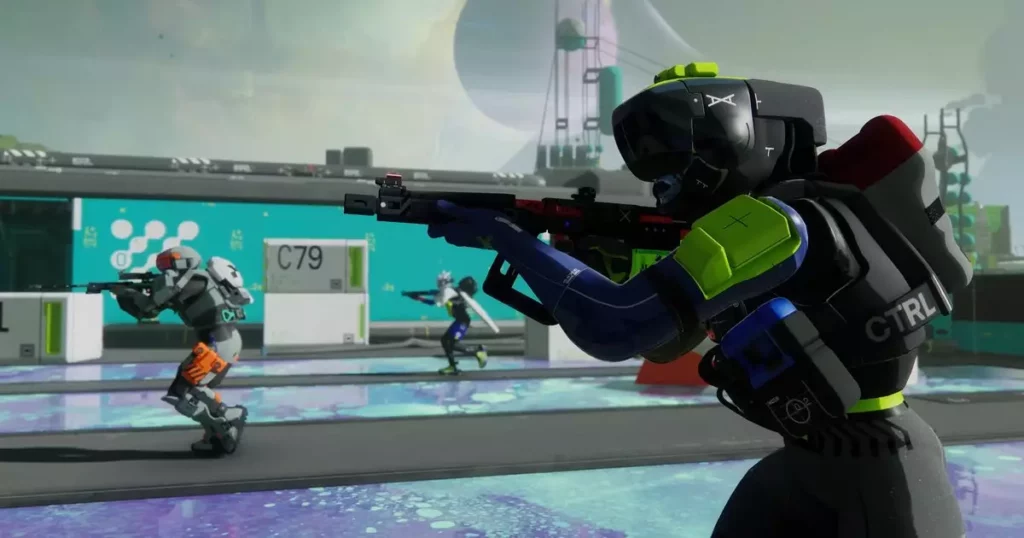Bungie’s long-awaited return to the world of Marathon represents not just a revival of a classic franchise but a creative rebirth. Set to launch on September 23rd, the game showcases visuals that hark back to the elegant aesthetics of titles such as Mirror’s Edge. However, it doesn’t merely replicate; it reinvents, blending modern techniques with the original charm that fans have cherished for decades. This ambitious visual approach is likely to draw in both die-hard enthusiasts and new players alike, hinting at a thrilling evolution in game design that could redefine the first-person shooter genre.
The graphics stand as a testament to Bungie’s commitment to pushing the boundaries of what’s possible in immersive gaming environments. By incorporating sleek design and fluid movement mechanics, Marathon promises a playground where players can engage in strategic combat that feels both refreshing and exhilarating.
Competitive Spirit and Tactical Depth
At the heart of Marathon’s gameplay lie intricate mechanics that promote not only competition but also collaboration. Players can assemble squads of three, which fosters a dynamic interplay of strategy and skill—a feature that speaks volumes about Bungie’s understanding of team play. Success hinges on the delicate balance between aggression and caution, encapsulated in a system where dying costs you hard-earned loot. This design creates a heightened sense of tension and urgency, pushing players not just to gun down foes, but to think critically about their actions.
Interestingly, the ability to play solo provides enough freedom for those who prefer a more individualistic approach. The potential for matches accommodating up to 18 players introduces an electrifying energy that could keep gamers on the edge of their seats. With six unique characters available at the game’s launch, it appears Bungie is keen on offering varied experiences while ensuring engagement through strategic depth.
Astorytelling Renaissance
One of Marathon’s most exciting prospects is its commitment to storytelling—a facet that today’s players increasingly demand. Unlike many multiplayer-only games that neglect narrative depth, Marathon promises seasonal narrative events, merging storytelling with multiplayer action. This could create a tightly-knit community of players who share a journey, rather than just isolated experiences, engendering a sense of belonging that is often missing in the competitive landscape.
The challenge will be in execution. Bungie has a storied history of creating rich worlds, yet their recent endeavors, particularly with Destiny 2, have raised eyebrows regarding narrative consistency, especially with their vaulting practices. As we approach the launch, it remains a pertinent question whether Bungie will take lessons from past missteps or if they will continue down a path that may alienate long-time fans seeking depth and cohesion.
Community Engagement and Expectations
The announcement featured Blacksmith, Ben Starr, who, while perhaps an unusual choice for a spokesperson, infused the discussion with a palpable excitement. His enthusiasm raised some eyebrows but ultimately added an engaging layer to the overall messaging. As Bungie gears up for the closed alpha test on April 23rd, community feedback will undoubtedly be crucial in shaping the game moving forward.
Despite skepticism toward the first-person shooter genre as a whole, there is an underlying optimism that Marathon could bridge the gap between hardcore and casual gamers. The innovative blend of competitive gameplay, stylish visuals, and layered storytelling offers the potential to convert even the most hesitant players. As Bungie has carved its niche within the gaming community, they have the credibility to elevate this reboot into a classic all its own.
In essence, Marathon stands at the threshold of possibility, and while anticipation builds, it carries with it a weight of expectation. For Bungie, the stakes are notably high—if they can indeed create a captivating multiplayer experience that prioritizes narrative richness alongside tactical gameplay, they may not only reclaim a legacy but also reshape the competitive landscape for first-person shooters in a meaningful way.









Leave a Reply